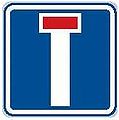Talk:Dead-end street
| Transport C‑class Low‑importance | ||||||||||
| ||||||||||
| Urban studies and planning Start‑class High‑importance | ||||||||||
| ||||||||||
When chased after, entering a cul-du-sac is disadvantageous, except when one is on foot or has a narrower vehicle than the chasing party, and there is a narrow exit.
Is this something that should be in an encyclopedia or "Hollywood 101"? --Lucky13pjn 20:06, Jun 13, 2004 (UTC)
Accidentally
Why is the cul-de-sac on this image so accidental?
--Abdull 03:43, 1 October 2006 (UTC)
- (moved image to right so as to not upset alignment of replies)
Dialect
I don't recall ever hearing this word growing up in Connecticut. They were always just 'courts.' Is this a regional phrase?
Its not a regional phrase...Americans are too close-minded to use it 74.96.215.187 02:24, 30 December 2006 (UTC)
- Not in Arizona we aren't... --Node 10:29, 24 March 2007 (UTC)
- I've definitely used this phrase since I was a child, too, and I'm from Jersey. --12.3.61.131 (talk) 18:05, 17 April 2009 (UTC)
I believe there is an aspect of dialect with this term. I had never even heard of the word "cul-de-sac" until I saw the Ed, Edd, and Eddy cartoons as a teenager. In my area (West Tennessee) a "cul-de-sac" is known simply as a "cove" by the majority of the population. (75.65.220.204 (talk) 01:00, 11 April 2013 (UTC))
Correct plural form
Please see Prescriptivism. While the etymologically correct form may well be "culs-de-sac", anyone who used that nowadays where I live, even in an academic paper, would be seen as pretentious or even wrong. "culs de sac" finds less than 100K results on Google (many of which are just people lecturing others about how it is the correct plural), while "cul de sacs" finds over 600K. I don't really care which one this article uses, but I do think the sentence about the correct plural form needs to be taken out of the introductory paragraph (and preferrably out of the article altogether) as it is clearly not the majority form. --Node 10:29, 24 March 2007 (UTC)
- Okay, I checked on Google to see if "culs-de-sac" was more common than "cul-de-sacs" in any of the «primary» English-speaking countries (US, CA, UK, IE, AU, NZ, IN, SG, ZA, NG...) and have found that it is not. It appears to be more common in some than in others (ratios are roughly 1:18 US, 1:82 CA, 1:4 UK, 1:44 IE, 1:37 AU, 1:5 NZ, 1:19 IN, 1:5 SG, 1:7 ZA, 0 NG, although there were less than 100 results for either in India and Singapore). It seems to me from these results (excluding Singapore and India due to relative paucity of data) that the use of "culs-de-sac" as a plural is somewhat regional, being well-accepted though not used by the majority in the UK, New Zealand, and South Africa, while in all others it is relatively foreign and unused. Note that in Canadian results I filtered for language, because if French-language results are not filtered out the ratio is 1:2, and if only French is allowed, the result is more like 5:1. --Node 10:56, 24 March 2007 (UTC)
Correct plural form 2
I have been a professional transportation and land use planner in the United States for 21 years. My wife is also a professional land use planner (AICP). We both hold Master's degrees. We have NEVER heard any other planner or traffic engineer say "culs-de-sac". Not one time. I can't recall seeing it pluralized that way in any academic journals. The 100s of professional planners I have known use "cul-de-sacs" because in American English it is one word and the plural goes at the end. However, I am not suprised that the know-it-alls at NPR would pluralize it "culs-de-sac". —Preceding unsigned comment added by 68.5.154.54 (talk) 00:44, 14 March 2009 (UTC)
Why there exist separately both "Cul-de-sac (disambiguation)" and "Other uses"?
Why these two points are not together?
I think that it is good to put all versions to "Cul-de-sac (disambiguation)" and in "Other uses" put the link only.
question
aren't cul-de-sacs normally differentiated from a normal dead-end because there are no corners in them? A dead-end can have corners but I always thought a cul-de-sac was rounded at the end.
- I was wondering that myself. Here in North Carolina, I always learned that cul-de-sacs were the ones with rounded ends, and a road that just stopped was a dead end. It seems there must be a difference of some kind, even if it's just in my state's DOT because they don't use Dead End signs in the rounded areas. They usually use No Outlet signs there instead, but my road had a Dead End sign. Suamme1 16:48, 2 October 2007 (UTC)
- I think cul de sacs are the roundabout of dead-ends. Once one drives into a cul de sac, just keep turning and you will leave. Exiting a dead-end is much more laborious. -Henry W. Schmitt 17:46, 2 October 2007 (UTC)
- I also associate "cul-de-sacs" with ends where you can turn a vehicle around and "dead ends" with more abrupt street endings, but apparently the sources use them interchangably. If a source can be found that explains the difference, it should be added to the article, but it needs to be noted that the two terms are also used interchangably. The NPR source and the William Safire source both use the two terms interchangably. Noroton (talk) 19:46, 12 July 2008 (UTC)
- All cul-de-sacs are dead ends, but not all dead ends are cul-de-sacs. Heck, there are some dead end streets or roads that don't even have any houses or buildings surrounding them! I think a distinction should be made between cul-de-sacs specifically designed & built in housing developments from streets and roads which formerly were throughfares but were partially closed-off for varying reasons to form dead ends.
- That is an accurate description of the relationship. As Suamme1 noted, a cul-de-sac is a specific tytpe of dead end with a rounded end for allowing for easy turning. Either the articles for cul-de-sac and dead end should be split or the article should be made to refer to dead ends with a specific cul-de-sac section. Introw (talk) 19:41, 13 November 2011 (UTC)
- I have always known cul-de-sac as a short indented area off the main street with 4-5 houses on a semi-circle. If there is any road then it will be a dead-end street, even if it has a turn around. I live on one of these, and have never called it a cul-de-sac. Also, I'm not aware that these dead-end streets often have connecting trails at the end. — Preceding unsigned comment added by 65.102.195.127 (talk) 17:22, 24 October 2011 (UTC)
French text
Shouldn't the text at the beginning have a translation? --escondites 17:01, 14 February 2008 (UTC)
- I'm not quite sure what you mean. It states in the second paragraph that it translates to "bottom of the bag". --Bossi (talk • gallery • contrib) 22:19, 14 February 2008 (UTC)
While it could be okay to say that cul-de-sac translates to "bottom of bag", if the article asserts that the transalation is literal then it is not quite right. A literal translation of "bottom of bag" would be "bas-de-sac", and going the other way, a literal translation of "cul-de-sac" would be "ass of bag".
Google Translate offers no meaning in Catalan for "cul" at all, which casts doubt on the article's assertion about that translation.
In French, Google Translate offers the following choices for the meaning of the word "cul":
1.ass
2.butt
3.rump
4.fanny (US sense)
5.prat (figurative)
At best, "bottom" is a euphemism, which isn't good enough for a translation described as literal.
Gteabo (talk) 10:00, 1 June 2010 (UTC)
Why do you lie? Cul is ass simply in catalan and any catalan speaker knows it. And Google translate offers the meaning "ass" for the word "cul" when you search this word. --88.14.247.253 (talk) 11:07, 6 December 2012 (UTC)
Traffic Calming
"... its modern use is to calm vehicle traffic. It has also been accused of creating communities which require the use of a car and are badly connected for pedestrians and cyclists."
It is important to remember that it is possible to build cul-de-sacs such that there are still route for pedestrians and cyclists. This encourages walking and cycling whilst still providing all the benefits of traffic calming. —Preceding unsigned comment added by 82.163.165.185 (talk) 11:12, 28 August 2008 (UTC)
not only french traffic sign
The article says the French use a specific road sign. In fact it is not just French:
-
Italy
-
Finland
-
Czech republic
-
Germany
-
Nederlands
-
Spain
-
Sweden
-
Slovakia
Cite errors
There appear to be a vast number of citation errors in the article -- perhaps as a result of vandalism. Can someone fix it? --MicahBrwn (talk) 07:00, 14 March 2009 (UTC)
"eead end" misspell ?
Why is there a misspell in the last paragraph of "eead end" ? am I missing something? Georgegh (talk) 02:13, 23 March 2009 (UTC)
- Because I missed the "d" key and hit the "e" key, which is right above it on my keyboard. But it's fixed now. Thanks.Ccrrccrr (talk) 12:33, 23 March 2009 (UTC)
Australian English?
I live in Australia and I have [b]never[/b] heard anyone call a Cul-de-sac a 'court', only, 'dead end', 'no-through-road' and 'cul-de-sac'. I realise these these streets can be called 'courts', for example Tenth Street could be called Tenth Court, but I've never heard anyone actually call a cul-de-sac a court, and both the houses I've ever lived in have been on cul-de-sacs.
JWPJ (talk) 16:52, 15 December 2009 (UTC)
- I would say that Aust street signage says 'No Through Road' and that 'No Through Road' and 'Dead End' are both used colloquially. 'Cul de sac' is also used colloquially, but less often. 'Court' and 'Close' are also occasionally used colloquially, but more for residenial streets with the bulbous end. Format (talk) 17:23, 12 January 2012 (UTC)
International Terminology
It is interesting to see different street signs, here. I remember getting lost in a cul de sac in Dublin, years ago, as I didn't know French (and was used to the German traffic sign that resambles the Belgian one).
But for further namings (Chinese etc.), I regard the selection of languages as arbitrary - this is rather a topic for the wikionary, I think. You could just point to the corresponding lemmata in these languages. — Preceding unsigned comment added by 78.49.167.81 (talk) 15:08, 8 October 2011 (UTC)
French article name?
Why does this article bear a French name when it's DEFINITELY not the most common name for what it describes? I'd say applying this is in order. --uKER (talk) 02:32, 12 June 2012 (UTC)
- Great, one week and no replies. Anyway, I don't care about this article to do the change myself, but I find it ridiculous that this article bears such a convoluted name as "cul-de-sac" and not simply "dead end" or some other more common term. --uKER (talk) 20:08, 20 June 2012 (UTC)










